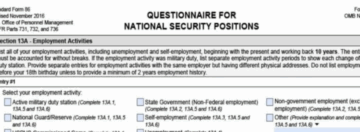OTH Discharge for Fraternization and Harassment Sinks Former Officer’s Clearance Appeal

I ran across a recent Defense Office of Hearing and Appeals (DOHA) case involving a former U.S. Marine Corp (USMC) officer who had elected to receive an “Other Than Honorable” type discharge in April of 2020 in lieu of being court martialed for misconduct involving sexual harassment, fraternization, and using a racial slur. Rarely do I see military officers who were booted out for that kind of misconduct in appeals cases, so I was surprised that he even tried to apply for a job that required a security clearance. Here are the highlights of his appeal:
The applicant was a former U.S. Coast Guard enlisted member before completing Officer Candidate School and getting commissioned in the USMC. From 2017-19 the applicant engaged in inappropriate sexual behavior with enlisted Marines and Sailors. He also fraternized with other enlisted personnel, used a racial slur numerous times, exhibited favoritism, and used sexual inuendo in his conversations with female enlisted members. The Naval Criminal Investigative Service (NCIS) opened an investigation into his misconduct, and he was charged under 5 separate codes from the Uniform Code of Military Justice. In lieu of getting court martialed, the applicant submitted a request for resignation and received an OTH type discharge.
Amazingly, in August of 2020, only 4 months later, he filled out an SF-86 for a cleared position. He disclosed his OTH and the other charges that led to his discharge, however, during his interview with the background investigator he walked back or downplayed the seriousness of his misconduct, providing alternative reasons for the sexual harassment and racial slur charges. It almost seemed like he was trying to say his behavior was taken out of context and that it really didn’t happen the way the NCIS and USMC said it did. The DOHA judge pointed out the fact that the applicant had not fully acknowledged his behavior was wrong nor had he accepted total responsibility for his misconduct – clearance eligibility denied.



Start the discussion